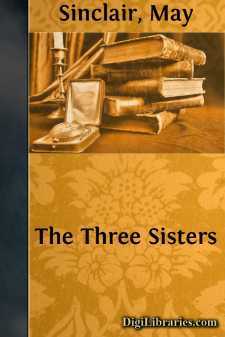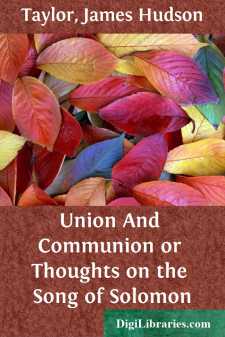Categories
- Antiques & Collectibles 13
- Architecture 36
- Art 48
- Bibles 22
- Biography & Autobiography 813
- Body, Mind & Spirit 142
- Business & Economics 28
- Children's Books 17
- Children's Fiction 14
- Computers 4
- Cooking 94
- Crafts & Hobbies 4
- Drama 346
- Education 46
- Family & Relationships 57
- Fiction 11829
- Games 19
- Gardening 17
- Health & Fitness 34
- History 1377
- House & Home 1
- Humor 147
- Juvenile Fiction 1873
- Juvenile Nonfiction 202
- Language Arts & Disciplines 88
- Law 16
- Literary Collections 686
- Literary Criticism 179
- Mathematics 13
- Medical 41
- Music 40
- Nature 179
- Non-Classifiable 1768
- Performing Arts 7
- Periodicals 1453
- Philosophy 64
- Photography 2
- Poetry 896
- Political Science 203
- Psychology 42
- Reference 154
- Religion 513
- Science 126
- Self-Help 84
- Social Science 81
- Sports & Recreation 34
- Study Aids 3
- Technology & Engineering 59
- Transportation 23
- Travel 463
- True Crime 29
The Tree of Heaven
by: May Sinclair
Categories:
Description:
Excerpt
I
Frances Harrison was sitting out in the garden under the tree that her husband called an ash-tree, and that the people down in her part of the country called a tree of Heaven.
It was warm under the tree, and Frances might have gone to sleep there and wasted an hour out of the afternoon, if it hadn't been for the children.
Dorothy, Michael and Nicholas were going to a party, and Nicky was excited. She could hear Old Nanna talking to Michael and telling him to be a good boy. She could hear young Mary-Nanna singing to Baby John. Baby John was too young himself to go to parties; so to make up for that he was riding furiously on Mary-Nanna's knee to the tune of the "Bumpetty-Bumpetty Major!"
It was Nicky's first party. That was why he was excited.
He had asked her for the third time what it would be like; and for the third time she had told him. There would be dancing and a Magic Lantern, and a Funny Man, and a Big White Cake covered with sugar icing and Rosalind's name on it in pink sugar letters and eight little pink wax candles burning on the top for Rosalind's birthday. Nicky's eyes shone as she told him.
Dorothy, who was nine years old, laughed at Nicky.
"Look at Nicky," she said, "how excited he is!"
And every time she laughed at him his mother kissed him.
"I don't care," said Nicky. "I don't care if I am becited!"
And for the fifth time he asked, "When will it be time to go?"
"Not for another hour and a half, my sweetheart."
"How long," said Nicky, "is an hour and a half?"
Frances had a tranquil nature and she never worried. But as she sat under her tree of Heaven a thought came that made a faint illusion of worry for her mind. She had forgotten to ask Grannie and Auntie Louie and Auntie Emmeline and Auntie Edie to tea.
She had come to think of them like that in relation to her children rather than to her or to each other.
It was a Tuesday, and they had not been there since Friday. Perhaps, she thought, I'd better send over for them now. Especially as it's such a beautiful afternoon. Supposing I sent Michael?
And yet, supposing Anthony came home early? He was always kind to her people, but that was the very reason why she oughtn't to let them spoil a beautiful afternoon for him. It could not be said that any of them was amusing.
She could still hear Mary-Nanna singing her song about the Bumpetty-Bumpetty Major. She could still hear Old Nanna talking to Michael and telling him to be a good boy. That could only end in Michael being naughty. To avert naughtiness or any other disaster from her children was the end of Frances's existence.
So she called Michael to come to her. He came, running like a little dog, obediently.
Michael was glad that he had been sent across the Heath to Grannie's house with a message. It made him feel big and brave. Besides, it would put off the moment when Mary-Nanna would come for him, to make him ready for the party. He was not sure that he wanted to go to it.
Michael did not much like going to Grannie's house either. In all the rooms there was a queer dark-greenness and creepiness. It smelt of bird-cages and elder bushes and of Grandpapa's funeral. And when you had seen Auntie Edie's Senegal wax-bills, and the stuffed fish, and the inside of Auntie Louie's type-writer there was nothing else to see.
His mother said that Grandpapa's funeral was all over, and that the green creepiness came from the green creepers. But Michael knew it didn't. She only said things like that to make you feel nice and comfy when you were going to bed. Michael knew very well that they had put Grandpapa into the drawing-room and locked the door so that the funeral men shouldn't get at him and take him away too soon. And Auntie Louie had kept the key in her pocket.
Funerals meant taking people away.
Old Nanna wouldn't let him talk about it; but Mary-Nanna had told him that was what funerals meant. All the same, as he went up the flagged path, he took care not to look through the black panes of the window where the elder bush was, lest he should see Grandpapa's coffin standing in the place where the big table used to be, and Grandpapa lying inside it wrapped in a white sheet.
Michael's message was that Mummy sent her love, and would Grannie and Auntie Louie and Auntie Emmeline and Auntie Edie come to tea? She was going to have tea in the garden, and would they please come early? As early as possible. That was the part he was not to forget.
The queer thing was that when Michael went to see Grannie and the Aunties in Grannie's house he saw four old women. They wore black dresses that smelt sometimes of something sweet and sometimes like your fingers when you get ink on them. The Aunties looked cross; and Auntie Emmeline smelt as if she had been crying. He thought that perhaps they had not been able to stop crying since Grandpapa's funeral. He thought that was why Auntie Louie's nose was red and shiny and Auntie Edie's eyelids had pink edges instead of lashes. In Grannie's house they never let you do anything. They never did anything themselves. They never wanted to do anything; not even to talk. He thought it was because they knew that Grandpapa was still there all the time.
But outside it the Aunties were not so very old. They rode bicycles. And when they came to Michael's Father's house they forgot all about Grandpapa's funeral and ran about and played tennis like Michael's mother and Mrs. Jervis, and they talked a lot.
Michael's mother was Grannie's child. To see how she could be a child you had only to think of her in her nightgown with her long brown hair plaited in a pigtail hanging down her back and tied with a blue ribbon. But he couldn't see how the three Aunties could be Grannie's other children. They were bigger than Grannie and they had grey hair. Grannie was a little thing; she was white and dry; and she had hair like hay. Besides, she hardly ever took any notice of them except to make a face at Auntie Emmeline or Auntie Edie now and then. She did it with her head a little on one side, pushing out her underlip and drawing it back again.
Grannie interested Michael; but more when he thought about her than when she was actually there. She stood for him as the mark and measure of past time. To understand how old Grannie was you had to think backwards; this way: Once there was a time when there was no Michael; but there was Mummy and there was Daddy. And once there was a time when there was no Mummy and no Daddy; but there was Grannie and there was Grandpapa. Now there was no Grandpapa. But he couldn't think back far enough to get to the time when there was no Grannie.
Michael thought that being Grannie must feel like being God.
Before he came to the black window pane and the elder bush he had to run down the slopes and jump the gullies on his side of the Heath, and cross the West Road, and climb the other slope to Grannie's side. And it was not till you got to the row of elms on Judge's Walk that you had to go carefully because of the funeral.
He stood there on the ridge of the Walk and looked back to his own side. There were other houses there; but he knew his father's house by the tree of Heaven in the garden.
The garden stood on a high, flat promontory jutting out into the Heath. A brown brick wall with buttresses, strong like fortifications on a breastwork, enclosed it on three sides. From the flagged terrace at the bottom of the garden you looked down, through the tops of the birch-trees that rose against the rampart, over the wild places of the Heath. There was another flagged terrace at the other end of the garden. The house rose sheer from its pavement, brown brick like the wall, and flat-fronted, with the white wings of its storm shutters spread open, row on row. It barred the promontory from the mainland. And at the back of it, beyond its kitchen garden and its courtyard, a fringe of Heath still parted it from the hill road that went from "Jack Straw's Castle" to "The Bull and Bush." You reached it by a lane that led from the road to the Heath.
The house belonged to the Heath and the open country. It was aware of nothing but the Heath and the open country between it and Harrow on the Hill. It had the air of all the old houses of Hampstead, the wonderful air of not acknowledging the existence of Bank Holidays. It was lifted up high above the town; shut in; utterly secluded.
Anthony Harrison considered that he had done well when he acquired West End House for his wife Frances, and for his children, Dorothea, Michael, Nicholas and John.
Frances had said that, if he was thinking of her, he needn't buy a big place, because she didn't want one. But he might buy it for the children if he liked. Anthony had said that she had no idea of what she mightn't want, once she began to give her mind to it, and that he would like to think of her living in it after he was gone. Not that he had any intention of going; he was only thirty-six (not much older than Frances) and incurably healthy. But since his wife's attention had become absorbed in the children--to the exclusion of every other interest--he was always trying to harrow her by the suggestion. And Frances only laughed at him and told him that he was a silly old thing, and that he needn't think he was going to get round her that way.
There was no other way open for Anthony; unless he were to go bankrupt or get pneumonia or peritonitis. Frances would have been the first to acknowledge that illness or misfortune constituted a claim. And the only things he ever did get were loud, explosive colds in his head which made him a mark for derision. His business was so sound that not even a revolution or a European war could shake it. And his appearance was incompatible with his pretensions to pathos.
It would have paid him better to have been small and weedy, or lamentably fat, or to have had a bald place coming, or crow's feet pointing to grey hairs; for then there might have been a chance for him. But Anthony's body was well made, slender and tall. He had blue eyes and black-brown hair, and the look of an amiable hawk, alert, fiercely benevolent. Frances couldn't see any pathos in the kind of figure she happened to admire most, the only kind she would have tolerated in a husband. And if she had seen any pathos in it she wouldn't have married it. Pathos, she said, was all very well in a father, or a brother, or a friend, but in choosing a husband you had to think of your children; and she had wanted boys that would look like Michael and Nicholas and John.
"Don't you mean," Anthony had said, "boys that will look like me?"
"I mean," she had answered, "exactly what I say. You needn't be so arrogant."
Her arrogance had been beyond all bearing since John, the third son, had been born.
And it was Frances, after all, who had made him buy West End House for her own reasons. Both the day nursery and the night nursery had windows to the south. It was the kind of house she had always dreamed of living in, and of Michael, or Nicky living in after she and Anthony were gone. It was not more than seven minutes' walk from the bottom of the lane to the house where her people lived. She had to think about the old people when the poor dears had come up to London in order to be thought about. And it had white storm shutters and a tree of Heaven in the garden.
And, because they had both decided that they would have that house whatever happened, they began to argue and to tease each other. Anthony had said it was all right, only the tree of Heaven wasn't a tree of Heaven; it was a common ash. He was one of the biggest timber merchants in the country and he ought to know. Frances said she mightn't know much, but she did know that was the kind of tree the people down in her part of the country called a tree of Heaven. Anthony said he couldn't help that. It didn't matter what they called it. It was a common ash.
Then she told him he had no poetry in his composition. She had always dreamed of having a tree of Heaven in her garden; and he was destroying her dream. He replied that he didn't want to destroy her dream, but the tree really was an ash. You could tell by the bark, and by the leaves and by the number and the shape of the leaflets. And anyhow, that was the first he'd heard about her dream.
"You don't know," said Frances, "what goes on inside me."
She said that if any of the children developed an imagination he needn't think he had anything to do with it.
"I shan't," said Anthony. "I wouldn't have anything to do with it if I could. Facts are good enough for me. The children must be brought up to realize facts."
An ash-tree was a fact and a tree of Heaven was a fancy; unless by any chance she meant ailanthus glandulosa. (He knew she didn't.) If she wanted to know, the buds of the ash were black like ebony. The buds of the tree of Heaven were rose-red, like--like bad mahogany. Wait till the spring and look at the buds.
Frances waited till the spring and looked at the buds, and, sure enough, they were black like ebony.
Anthony also said that if they were choosing a house for the children, it was no earthly use to think about the old people. For the old people would go and the children would remain.
As if to show how right he was, Grandpapa had died early in that summer of 'ninety-five, one month after they had moved into West End House. That still left Grannie and Auntie Louie and Auntie Emmeline and Auntie Edie for Anthony to look after.
She was thinking of them now. She hoped that they would come early in time to see the children. She also hoped that they would go early, so that she and Anthony might have their three sets of tennis before dinner in peace.
There would be no peace if Louie and Edie wanted to play too. The one thing that Anthony could not stand was people wanting to do things they couldn't do, and spoiling them for those who could. He used to say that the sight of Louie anywhere near the tennis court put him off his stroke.
Again, the faint illusion of worry was created by the thought that this dreadful thing might happen, that Louie and Edie might want to play and that Anthony would be put off his stroke and be annoyed, and that his annoyance, his just and legitimate annoyance, would spoil the perfection of the afternoon. And as she played with the illusion it made more real her tranquillity, her incredible content.
Her hands were busy now putting decorative stitches into a frock for John. She had pushed aside a novel by George Moore and a volume of Ibsen's plays. She disliked Ibsen and disapproved of George Moore. Her firm, tight little character defended itself against every form of intellectual disturbance. A copy of the Times had fallen from her lap to her feet. Jane, the cat, had found it there, and, purring loudly, had trodden it down into a bed, and now lay on it, asleep. Frances had informed herself of the affairs of the nation.
At the bottom of her mind was the conviction (profound, because unconscious) that the affairs of the nation were not to be compared for interest with her own affairs, and an attitude of condescension, as if she honoured the Times by reading it and the nation by informing herself of its affairs; also the very distinct impression that evening papers were more attractive than morning papers. She would have admitted that they owed their attraction to the circumstance that Anthony brought them home with him in his pocket, and that in the evening she was not obliged to inform herself of what might be happening. Anthony was certain to inform her.
Not that anything ever did happen. Except strikes; and even then, no sooner did the features of the strike begin to get dramatic than they were instantly submerged in the flood of conversation that was let loose over them. Mrs. Anthony pitied the poor editors and reporters while Parliament was sitting. She saw them as rather silly, violent and desperate men, yet pathetic in their silliness, violence and desperation, snatching at divorces, and breach of promise cases, and fires in paraffin shops, as drowning men snatch at straws.
Her imagination refused to picture any end to this state of things. There would just be more speeches and more strikes, and still more speeches, going on for ever and ever at home; while foreign affairs and the British Empire went on for ever and ever too, with no connection between the two lines of sequence, and no likeness, except that both somehow went on and on.
That was Anthony's view of England's parliament and of her imperial policy; and it was Mrs. Anthony's. Politics, Anthony said, had become static; and he assured Frances that there was no likelihood that they would ever become dynamic again--ever.
Anthony's view of politics was Mrs. Anthony's view of life.
Nothing ever really happened. Things did not change; they endured; they went on. At least everything that really mattered endured and went on. So that everything that really mattered could--if you were given to looking forward--be foreseen. A strike--a really bad one--might conceivably affect Anthony's business, for a time; but not all the strikes in the world, not all the silly speeches, not all the meddling and muddling of politicians could ever touch one of those enduring things.
Frances believed in permanence because, in secret, she abhorred the thought of change. And she abhorred the thought of change because, at thirty-three, she had got all the things she wanted. But only for the last ten years out of the thirty-three. Before that (before she was Mrs. Anthony), wanting things, letting it be known that you wanted them, had meant not getting them. So that it was incredible how she had contrived to get them all. She had not yet left off being surprised at her own happiness. It was not like things you take for granted and are not aware of. Frances was profoundly aware of it. Her happiness was a solid, tangible thing. She knew where it resided, and what it was made of, and what terms she held it on. It depended on her; on her truth, her love, her loyalty; it was of the nature of a trust. But there was no illusion about it. It was the reality.
She denied that she was arrogant, for she had not taken one of them for granted, not even Dorothy; though a little arrogance might have been excusable in a woman who had borne three sons and only one daughter before she was thirty-two. Whereas Grannie's achievement had been four daughters, four superfluous women, of whom Anthony had married one and supported three.
To be sure there was Maurice. But he was worse than superfluous, considering that most of the time Anthony was supporting Maurice, too.
She had only known one serious anxiety--lest her flesh and blood should harbour any of the blood and flesh left over after Morrie was made. She had married Anthony to drive out Morrie from the bodies and souls of her children. She meant that, through her and Anthony, Morrie should go, and Dorothea, Michael, Nicholas and John should remain.
As Frances looked at the four children, her mouth tightened itself so as to undo the ruinous adoration of her eyes. She loved their slender bodies, their pure, candid faces, their thick, straight hair that parted solidly from the brush, clean-cut and shining like sheets of polished metal, brown for Dorothy, black-brown for Nicholas, red gold for Michael and white gold for John. She was glad that they were all made like that; slender and clear and hard, an
















